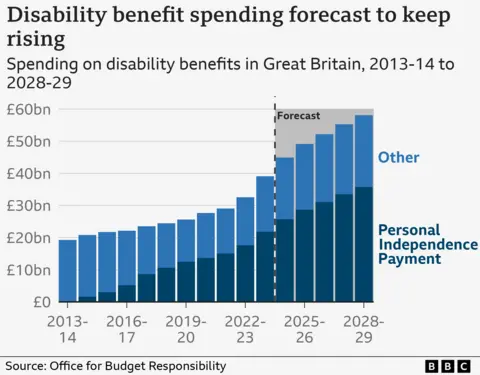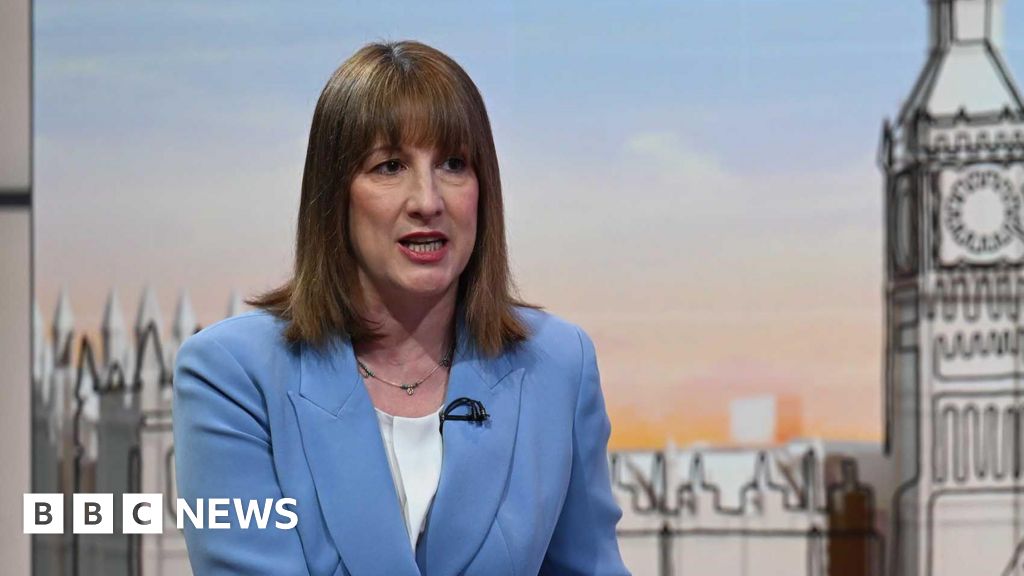ARTICLE AD BOX

 PA Media
PA Media
Conservative leadership hopeful Robert Jenrick has said he would reduce benefits spending in order to enable cuts to income tax.
In a speech, the former minister said unemployed claimants should face tougher sanctions if they refuse to take up suitable job offers.
He also vowed to tackle "misuse" of the sickness benefits system, arguing it was "medicalising normal human experiences”.
He added that reducing economic inactivity to pre-Covid levels could save the taxpayer £12bn, equivalent to cutting the basic rate of income tax by 2p.
The pledges largely echo proposals set out by the Tories ahead of the election.
Speaking at the Centre for Policy Studies think-tank, Jenrick said there should be attempts to tighten eligibly for disability payments, which have risen sharply since the pandemic and are projected to rise further in coming years.
Although payments for the “genuinely unable” should continue, he said, "we should not be blind to the rise and misuse of our system”.
In an apparent reference to rising claims for mental health reasons, he added: “Too many indicators now show that we are medicalising normal human experiences."
He also set out proposed changes for those on out-of-work benefits, including tougher penalties for people who fail to meet conditions attached to benefit payments, such as attending job centre meetings.
Long-term claimants on work coaching schemes who remain jobless should face additional conditions after 12 months, rather than 18 currently, he argued.
He said returning both the disability and incapacity caseload to pre-pandemic levels would save £12bn, adding: "That would equate to almost 2p off the basic rate of income tax."
Asked whether as leader he would commit the Tories to 2p cut to the basic rate of income tax at the next election, he replied that he was not seeking to write the party's next manifesto, but rather to “set out what the choice is”.


Disability benefit payments are projected to rise sharply over the coming years, from £39bn in 2023-24 to £58bn in 2028-29.
The majority of this is estimated to come from extra spending on Personal Independence Payment (PIP), which is paid to working-aged people to support them with additional health costs, and can be paid to those in work.
Separate income-related and out-of-work benefits can be topped up for people whose health condition is judged to restrict their ability to work.
The Tories promised to overhaul PIP payments before the election, but they were voted out of office before a consultation on the plans finished.
The suggested changes included replacing cash payments for those with mental health conditions with improved access to treatment.
The party also promised to overhaul PIP testing, but its election manifesto offered no details beyond promising a “more objective” approach.
The Institute for Fiscal Studies think tank warned the idea was "far easier said than done," noting that predicted savings from previous attempts to deliver savings to the benefits system had failed to materialise.
'Labour's worst nightmare'
The speech comes as Tory members receive their ballots for the leadership vote, with a winner due to be announced on 2 November.
Jenrick's rival Kemi Badenoch, tipped as the favourite among party activists, has meanwhile sought to present herself as "Labour's worst nightmare".
In an interview with the Daily Telegraph, the shadow business secretary, who was born in London but spent the majority of her childhood in Nigeria, said as leader she would nullify any Labour attempts to depict the Tories as racially prejudiced.
She also added she knew how to find Labour's "weak points", citing the move to charge VAT on private school fees as a "tax on aspiration".
She also launched a swipe at Jenrick's signature policy of leaving the European Convention on Human Rights (ECHR) in a bid to make it easier for the UK to deport failed asylum seekers.
Jenrick has argued the party faces a Brexit-style choice between leaving or remaining in the convention, on the basis that reforming it is a "fantasy".
But Badenoch told the newspaper: “Trying to recreate the referendum is not something people want to hear right now."

 7 months ago
29
7 months ago
29








 English (US) ·
English (US) ·